The "GR-PEACH_Audio_Playback_Sample" is a sample code that can provides high-resolution audio playback of FLAC format files. It also allows the user to audio-playback control functions such as play, pause, and stop by manipulating key switches.
Dependencies: R_BSP TLV320_RBSP USBHost_custom
Note
For a sample program of with LCD Board,
please refer to GR-PEACH_Audio_Playback_7InchLCD_Sample.
Introduction
The "GR-PEACH_Audio_Playback_Sample" is a sample code that can provides high-resolution audio playback of FLAC format files. It also allows the user to audio-playback control functions such as play, pause, and stop by manipulating key switches.
1. Overview of the Sample Code
1.1 Software Block Diagram
Figure 1.1 shows the software block diagram.
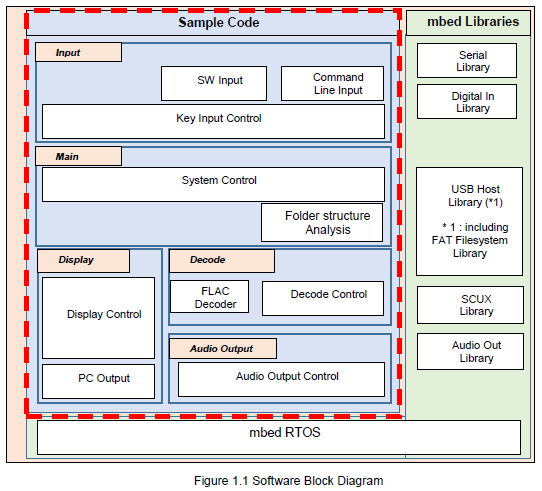
1.2 Pin Definitions
Table 1.1 shows the pins that this sample code are to use.
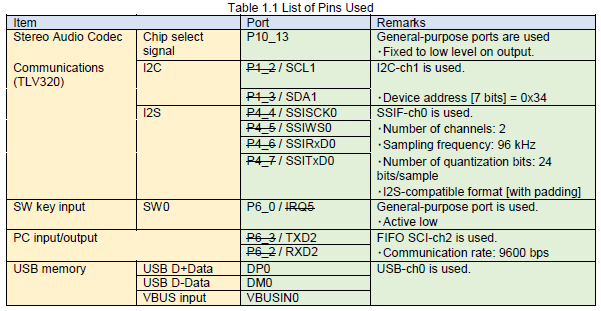
2. Sample Code Operating Environment
This sample code runs in GR-PEACH + the Audio/Camera shield for the GR-PEACH environment. This section explains the functions of the ports that are used by this sample code.
2.1 Operating Environment
Figure 2.1 shows the configuration of the operating environment for running this sample code.
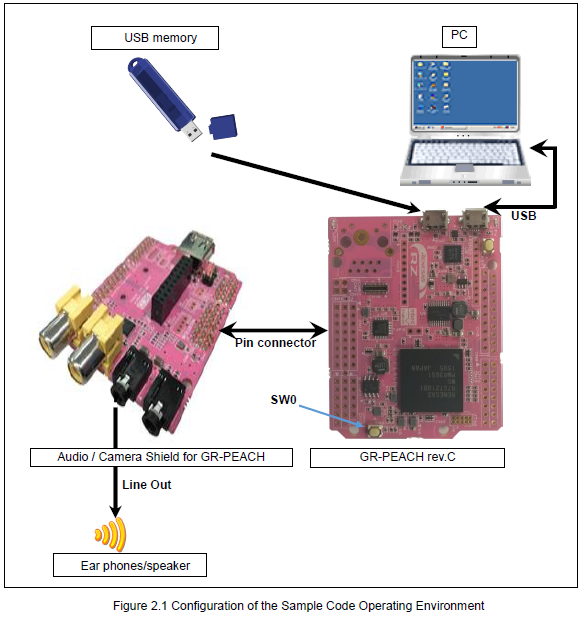
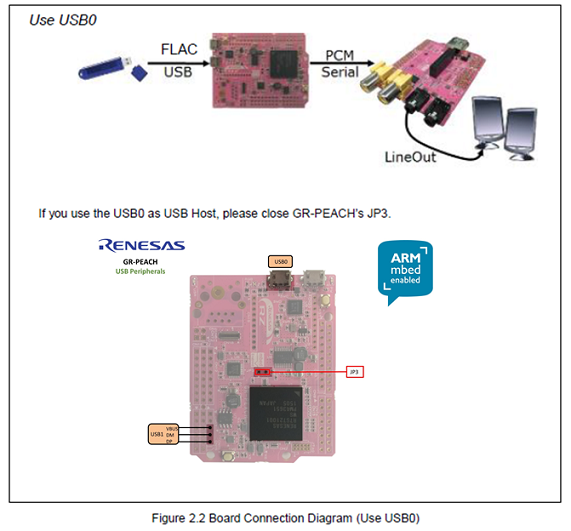
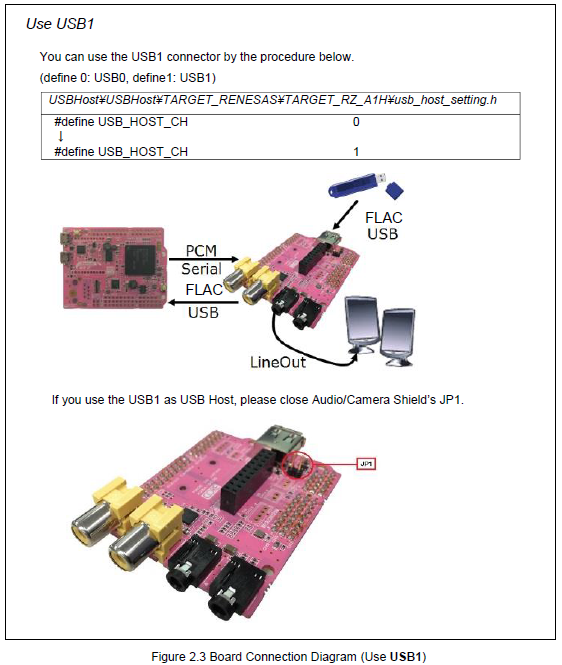
2.2 List of User Operations
A list of user operations on the command line, TFT touch keys, and switch key that the user can perform for this sample code is shown in. Table 2.1.

3. Function Outline
The functions of this sample code are summarized in Table 3.1 to Table 3.3.
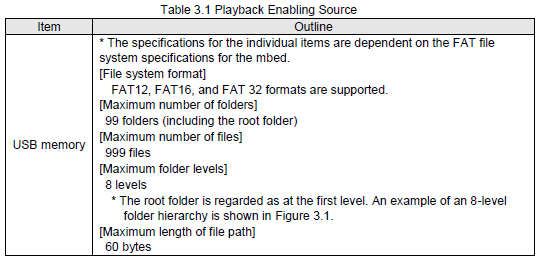
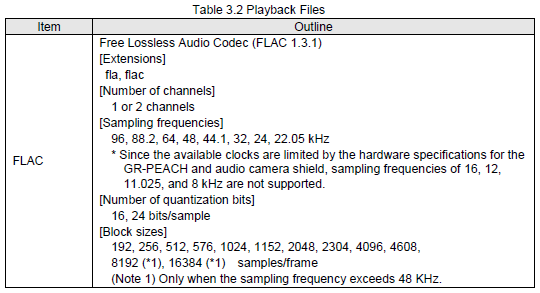
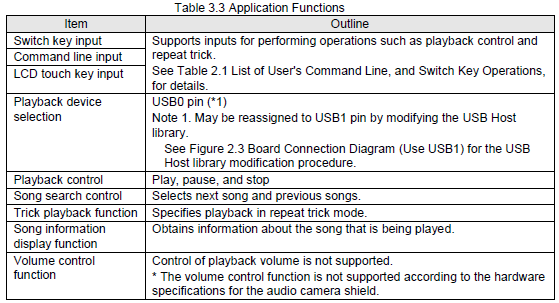
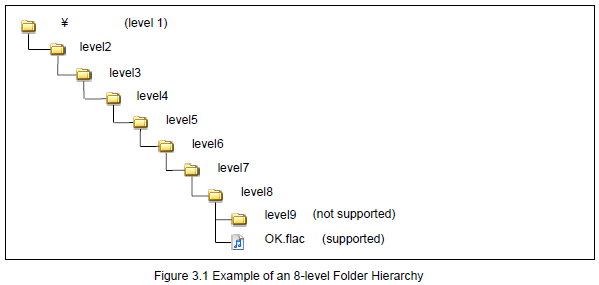
3.1 Playback Control
The playback control that the sample code supports include play, pause, stop, skip to next, and skip to previous.
3.2 Trick Play Control
Manipulating "Repeat" alternates between "Repeat mode On" and "Repeat mode Off". The default mode is "Repeat mode On". When the repeat mode is on, the playback of the first song starts after the playback of the last song is finished. When the repeat mode is off, the sample code enters the stopped state after the playback of the last song is finished.
3.3 Acquisition of the Song Information
The information of the song being played is obtained by operating the "Play info" during the playback of the song. Table 3.4 lists the items of information that can be obtained by the "Play info" operation.

3.4 How the Folder Structure is Analyzed
The sample coded analyzes the folder structure in the breadth-first search order. The order in which files are numbered is illustrated in Table 3.5. The sample code does not sort the files by file or folder name.
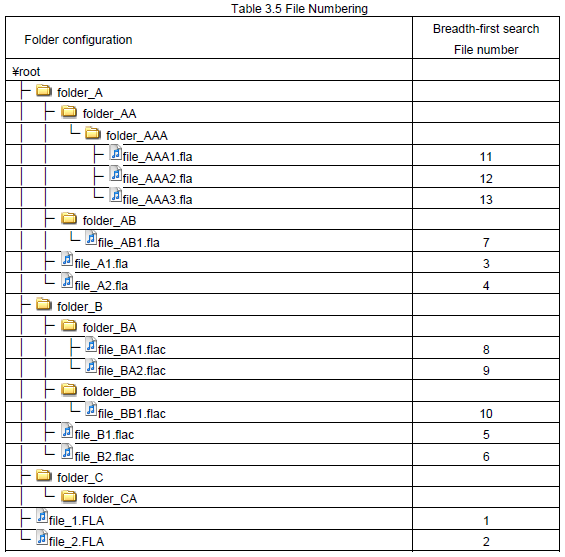
4.Others
The default setting of serial communication (baud rate etc.) in mbed is shown the following link.
Please refer to the link and change the settings of your PC terminal software.
The default value of baud rate in mbed is 9600, and this application uses baud rate 9600.
https://developer.mbed.org/teams/Renesas/wiki/GR-PEACH-Getting-Started#install-the-usb-serial-communication
flac/include/share/alloc.h
- Committer:
- Osamu Nakamura
- Date:
- 2017-03-31
- Revision:
- 6:df19c3e787ca
- Parent:
- 0:ee40da884cfc
File content as of revision 6:df19c3e787ca:
/* alloc - Convenience routines for safely allocating memory
* Copyright (C) 2007-2009 Josh Coalson
* Copyright (C) 2011-2014 Xiph.Org Foundation
*
* Redistribution and use in source and binary forms, with or without
* modification, are permitted provided that the following conditions
* are met:
*
* - Redistributions of source code must retain the above copyright
* notice, this list of conditions and the following disclaimer.
*
* - Redistributions in binary form must reproduce the above copyright
* notice, this list of conditions and the following disclaimer in the
* documentation and/or other materials provided with the distribution.
*
* - Neither the name of the Xiph.org Foundation nor the names of its
* contributors may be used to endorse or promote products derived from
* this software without specific prior written permission.
*
* THIS SOFTWARE IS PROVIDED BY THE COPYRIGHT HOLDERS AND CONTRIBUTORS
* ``AS IS'' AND ANY EXPRESS OR IMPLIED WARRANTIES, INCLUDING, BUT NOT
* LIMITED TO, THE IMPLIED WARRANTIES OF MERCHANTABILITY AND FITNESS FOR
* A PARTICULAR PURPOSE ARE DISCLAIMED. IN NO EVENT SHALL THE FOUNDATION OR
* CONTRIBUTORS BE LIABLE FOR ANY DIRECT, INDIRECT, INCIDENTAL, SPECIAL,
* EXEMPLARY, OR CONSEQUENTIAL DAMAGES (INCLUDING, BUT NOT LIMITED TO,
* PROCUREMENT OF SUBSTITUTE GOODS OR SERVICES; LOSS OF USE, DATA, OR
* PROFITS; OR BUSINESS INTERRUPTION) HOWEVER CAUSED AND ON ANY THEORY OF
* LIABILITY, WHETHER IN CONTRACT, STRICT LIABILITY, OR TORT (INCLUDING
* NEGLIGENCE OR OTHERWISE) ARISING IN ANY WAY OUT OF THE USE OF THIS
* SOFTWARE, EVEN IF ADVISED OF THE POSSIBILITY OF SUCH DAMAGE.
*/
#ifndef FLAC__SHARE__ALLOC_H
#define FLAC__SHARE__ALLOC_H
#ifdef HAVE_CONFIG_H
# include <config.h>
#endif
/* WATCHOUT: for c++ you may have to #define __STDC_LIMIT_MACROS 1 real early
* before #including this file, otherwise SIZE_MAX might not be defined
*/
#include <limits.h> /* for SIZE_MAX */
#if HAVE_STDINT_H
#include <stdint.h> /* for SIZE_MAX in case limits.h didn't get it */
#endif
#include <stdlib.h> /* for size_t, malloc(), etc */
#include "share/compat.h"
#ifndef SIZE_MAX
# ifndef SIZE_T_MAX
# ifdef _MSC_VER
# ifdef _WIN64
# define SIZE_T_MAX 0xffffffffffffffffui64
# else
# define SIZE_T_MAX 0xffffffff
# endif
# else
# error
# endif
# endif
# define SIZE_MAX SIZE_T_MAX
#endif
/* avoid malloc()ing 0 bytes, see:
* https://www.securecoding.cert.org/confluence/display/seccode/MEM04-A.+Do+not+make+assumptions+about+the+result+of+allocating+0+bytes?focusedCommentId=5407003
*/
static inline void *safe_malloc_(size_t size)
{
/* malloc(0) is undefined; FLAC src convention is to always allocate */
if(!size)
size++;
return malloc(size);
}
static inline void *safe_calloc_(size_t nmemb, size_t size)
{
if(!nmemb || !size)
return malloc(1); /* malloc(0) is undefined; FLAC src convention is to always allocate */
return calloc(nmemb, size);
}
/*@@@@ there's probably a better way to prevent overflows when allocating untrusted sums but this works for now */
static inline void *safe_malloc_add_2op_(size_t size1, size_t size2)
{
size2 += size1;
if(size2 < size1)
return 0;
return safe_malloc_(size2);
}
static inline void *safe_malloc_add_3op_(size_t size1, size_t size2, size_t size3)
{
size2 += size1;
if(size2 < size1)
return 0;
size3 += size2;
if(size3 < size2)
return 0;
return safe_malloc_(size3);
}
static inline void *safe_malloc_add_4op_(size_t size1, size_t size2, size_t size3, size_t size4)
{
size2 += size1;
if(size2 < size1)
return 0;
size3 += size2;
if(size3 < size2)
return 0;
size4 += size3;
if(size4 < size3)
return 0;
return safe_malloc_(size4);
}
void *safe_malloc_mul_2op_(size_t size1, size_t size2) ;
static inline void *safe_malloc_mul_3op_(size_t size1, size_t size2, size_t size3)
{
if(!size1 || !size2 || !size3)
return malloc(1); /* malloc(0) is undefined; FLAC src convention is to always allocate */
if(size1 > SIZE_MAX / size2)
return 0;
size1 *= size2;
if(size1 > SIZE_MAX / size3)
return 0;
return malloc(size1*size3);
}
/* size1*size2 + size3 */
static inline void *safe_malloc_mul2add_(size_t size1, size_t size2, size_t size3)
{
if(!size1 || !size2)
return safe_malloc_(size3);
if(size1 > SIZE_MAX / size2)
return 0;
return safe_malloc_add_2op_(size1*size2, size3);
}
/* size1 * (size2 + size3) */
static inline void *safe_malloc_muladd2_(size_t size1, size_t size2, size_t size3)
{
if(!size1 || (!size2 && !size3))
return malloc(1); /* malloc(0) is undefined; FLAC src convention is to always allocate */
size2 += size3;
if(size2 < size3)
return 0;
if(size1 > SIZE_MAX / size2)
return 0;
return malloc(size1*size2);
}
static inline void *safe_realloc_add_2op_(void *ptr, size_t size1, size_t size2)
{
size2 += size1;
if(size2 < size1)
return 0;
return realloc(ptr, size2);
}
static inline void *safe_realloc_add_3op_(void *ptr, size_t size1, size_t size2, size_t size3)
{
size2 += size1;
if(size2 < size1)
return 0;
size3 += size2;
if(size3 < size2)
return 0;
return realloc(ptr, size3);
}
static inline void *safe_realloc_add_4op_(void *ptr, size_t size1, size_t size2, size_t size3, size_t size4)
{
size2 += size1;
if(size2 < size1)
return 0;
size3 += size2;
if(size3 < size2)
return 0;
size4 += size3;
if(size4 < size3)
return 0;
return realloc(ptr, size4);
}
static inline void *safe_realloc_mul_2op_(void *ptr, size_t size1, size_t size2)
{
if(!size1 || !size2)
return realloc(ptr, 0); /* preserve POSIX realloc(ptr, 0) semantics */
if(size1 > SIZE_MAX / size2)
return 0;
return realloc(ptr, size1*size2);
}
/* size1 * (size2 + size3) */
static inline void *safe_realloc_muladd2_(void *ptr, size_t size1, size_t size2, size_t size3)
{
if(!size1 || (!size2 && !size3))
return realloc(ptr, 0); /* preserve POSIX realloc(ptr, 0) semantics */
size2 += size3;
if(size2 < size3)
return 0;
return safe_realloc_mul_2op_(ptr, size1, size2);
}
#endif